Mozambique: Impire residents flee as armed groups pass nearby
Mozambique: After the riots, minibus drivers face ‘usual challenges’
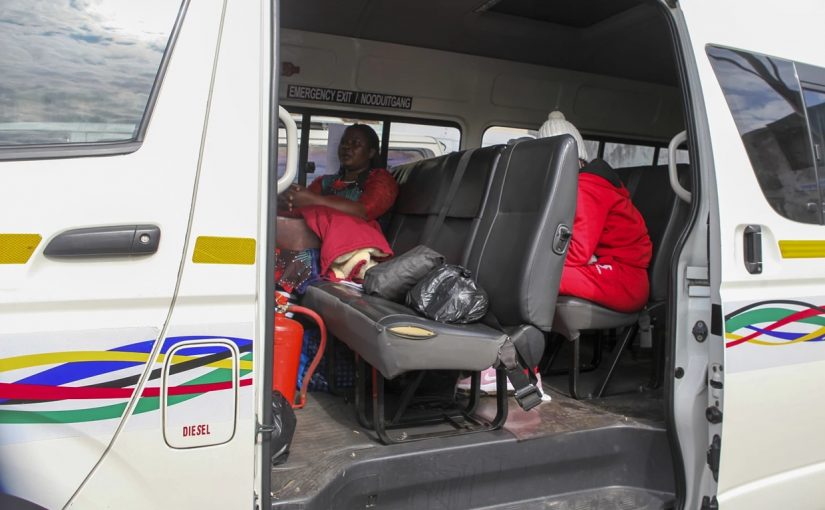
File photo: Lusa
The road blockades during the post-election protests brought “a lot of damage” to hauliers, but with the return to normality, the road once again became the main source of livelihood for hundreds of drivers, despite the “usual challenges”.
Adolfo Tivane, 31, supports eight people with the 10,000 meticais (€136) he earns monthly driving a minibus, locally known as a “chapa.”
With his nieces’ schooling and feeding his family, this driver’s life has always been “tight” for almost 10 years transporting passengers. Still, nothing has been more difficult than the uncertainties of recent months, marked by stoppages and protests almost everywhere in the country.
“There are eight of us in my house, all of whom are my responsibility: my mum, my sisters, my nieces, (…) With the little I earn, I try to help my family, it’s not even enough for me to save or try to make a life for myself,” Adolfo Tivane told Lusa.
His Toyota Hiace’s engine starts running at five in the morning on one of Maputo’s main routes, which links the centre of the capital to the municipality of Matola, a distance of almost 15 kilometres.
Adolfo’s route was one of the worst affected by the unrest that has raged in Mozambique since October 2024, with roads blocked and clashes between the authorities and protesters.
“We’ve had a lot of damage, and we’ve been at a standstill for a long time. That hurt both us and our employer,” explains Adolfo, adding that despite the return to normality in recent weeks, he still hasn’t recovered from the losses.
Most drivers of “chapas”, the main means of transport in urban areas in Mozambique, work under an agreement with the vehicle’s owner stipulating a daily target.
The minimum price for passengers in these vans is 15 meticais (€0.20), and the transporters must make as many rounds as possible.
At the peak of the demonstrations, hitting the road was dangerous on some days, which meant that the hauliers missed the targets set by the vehicle owners.
“When people were demonstrating, they wouldn’t accept vehicles travelling on public roads. The chapa, of course, had to stop,” Salvador Massango, 33, another haulier, explained to Lusa.
Since 21 October, Mozambique has experienced severe social unrest, protests, demonstrations, and stoppages, first called by Venâncio Mondlane, a former presidential candidate who rejects the 9 October election results. There have been violent clashes between the police and demonstrators, as well as looting and destruction of public and private facilities.
The unrest that has affected the country in recent months has led to the deaths of around 390 people, according to non-governmental organisations monitoring the electoral process, with Mozambique’s government confirming at least 80 deaths, as well as the destruction of 1,677 commercial establishments, 177 schools and 23 health facilities during the demonstrations.
However, on 23 March, Mondlane and Mozambican President Daniel Chapo, who had already taken office, met for the first time and a commitment was made to end the post-election violence in the country.
With the end of the unrest, at least in recent months, the “chapas” have returned frequently to the capital, but the well-known challenges continue, from road maintenance to wrestling with the municipal authorities.
“What spoils it is the municipal police, who don’t know how to work. Even if the driver is in a legal situation, for them, you are never legal, (…) They create tricks to get money out of you, that’s what we don’t want,” Joaquim Muiambo, 38, another transporter on a route linking Maputo and Matola, told Lusa.
Although they are one of the main players in urban mobility in Mozambique, the “chapas” are unable to fully satisfy people’s needs, even with the existence of public buses, which keeps alive a “chronic” problem in the country, with the main bus stops always full and buses almost at capacity.
Lacerda Felisberto, 21, a student in Maputo city, told Lusa that he sometimes has to “fight” with other passengers to catch the bus to school.
“In the morning, it’s been a problem, and in the afternoon, towards the end of the day, it’s a war to get transport here,” says Felisberto, noting that sometimes the collectors in the vans only load those who don’t make it to the vehicle’s final destination.
“It’s a very unfortunate situation in our country. We have a lack of transport. In our day-to-day lives, it hasn’t been easy, we’ve had difficulties, especially at the terminals, so we have to fight for transport,” Paulo Muache, 34, another passenger, told Lusa.
The transport sector in Mozambique is one of the most deficient in public services, especially road transport.
The resource crisis has triggered the use of private open-top vehicles, popularly known as “My Love”, given the physical proximity with which passengers travel in the freight box and the need sometimes to hug each other to avoid falling on the road.


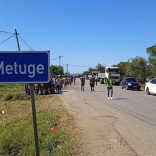

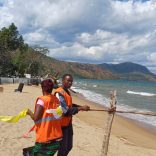

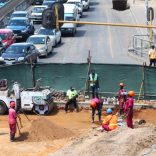
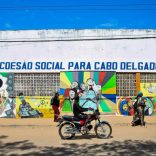




Leave a Reply
Be the First to Comment!
You must be logged in to post a comment.
You must be logged in to post a comment.